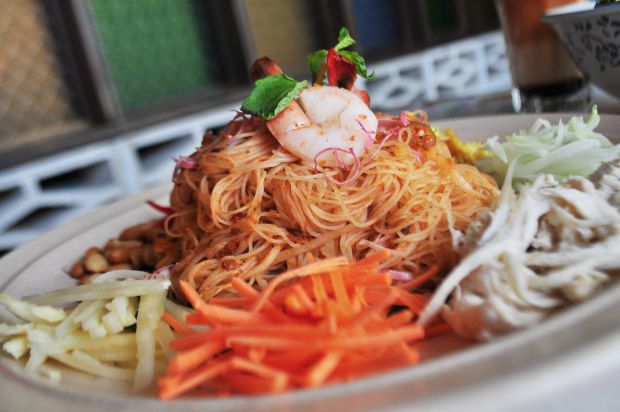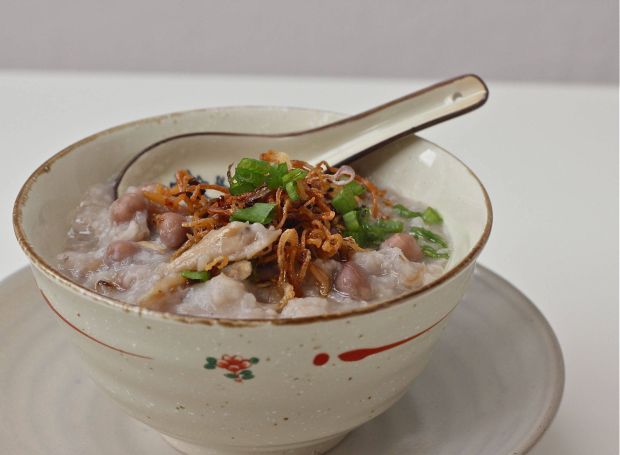Nostalgia and good old Nyonya food await diners at onde onde in Desa ParkCity, Kuala Lumpur.
For every kind of food one has tasted, there is a memory associated with it. For Paul Khong, the onde onde, or green glutinous orbs with a gula melaka filling, brings back happy memories of the Nyonya household he grew up in.
So it was only natural that the 31-year-old father of three should name his nine-month-old restaurant in Desa ParkCity, Kuala Lumpur, onde onde (spelt with lower case). He wanted a homely and casual atmosphere to evoke the nostalgia of a Straits-inspired kopi tiam.

Young foodie : Paul Khong, 31, evokes the nostalgia of a Straits-style kopi tiam with his restaurant, onde onde.— Photos by Grace Chen
Tins of love letters and peanut biscuits greet the visitor at the entrance, which is decked with red banners. Bottles of cincaluk and prawn paste line the front counter, while an array of nyonya kuih, all made by the owner’s mother, tempt diners.
Despite his youthful appearance, Khong is not new to the food and beverage industry. Having graduated with an Australian degree in human resource management, he briefly worked in a mortgage department before going solo at 23, when he decided to operate an ice cream franchise.
Today, he’s happily running a Nyonya eatery whose pretty wooden stools and blue ceramic pots are a tribute to his parents. His mother hails from Malacca, while his late father was from Penang.
“We had a very strong food culture. My mother, Sally Teh, played the role of kitchen goddess to the hilt during our growing years. She was an able host who could summon the entire clan with her culinary skills,” recalls Khong.
The recipes in the menu are heirlooms from the family’s cookbook. This is a good thing because their clientele comes from a generation not raised on fast food and which frowns on the use of preservatives. There’s no cheating this lot. Try replacing the fresh mackerel in the assam laksa with canned sardines, and you’d be sniffed out in a trice.
Khong got hold of the family’s kitchen secrets by being a helpful son in the kitchen. The dishes in onde onde come with their own anecdotes.
“Whenever my mother hosted a party, the first thing that came to everyone’s mind was her assam laksa. At family gatherings, it was not uncommon for my aunties and uncles to have debates on where you could find the best assam laksa. In the end, the conclusion was always the same: the best laksa was always from my mum’s kitchen,” smiles Khong.
It was also a dish that his late father, Khong Tat Kwan, would look forward to when he returned from trips to oversee the family oil palm plantations in East Malaysia. The elder Khong passed away in an accident in 1995 when his son was only 16.
Sporting the right level of sour and spicy taste, the laksa comes with a generous portion of mackerel and mint leaves.
The Prawn Noodle (priced at RM9.90, like the laksa) holds another touching story – this one of the strong bond between daughter and mother-in-law.
According to Khong, the original recipe was developed by his mother while she was single. When she married into the Khong family, it was improved upon with the help of Khong’s paternal grandmother. The dish is a symbol of the close relationship between the two. And what a heady aroma the soup has!
This, says Khong, is due to the generous amount of prawn paste in the broth. The dish seems to be a house favourite as many of the diners were tucking into it when we walked in.
But the best value for money is probably the Kerabu Meehoon (RM9.90). Taking a leaf from the Thai glass noodle salad, the cook has given the dish a Malaysian twist by frying the meehoon in fish sauce and surrounding it with freshly cut strips of red chilies, onions, mango and cucumber. There are also chicken strips and prawns, with roasted peanuts added for crunch.
True to the outlet’s namesake, the onde onde (RM3.50 for seven pieces) here is absolutely delicious. Soft, chewy and served with a generous heap of desiccated coconut, they sport just the right amount of pop. Bite into one, and you will feel a small explosion of gula melaka that coats the tongue in a thick, gooey syrup.
We also like the Duck Kaya Toast (RM2.80 per set) and coffee (RM 2.50). This combination makes for the ultimate comfort food. What makes the egg jam special is the use of duck eggs, which are believed to be superior in taste compared to chicken eggs.
However, we find the egg jam in the toast too runny. By restaurant standards, it should have a thick, paste-like consistency. Still, the generous knobs of margarine make up for this shortcoming. The coffee, with its strong nutty notes and slightly bitter undertones, is heavenly.
Why are toast and half-boiled eggs so popular nowadays?
“Even the coffee shops in our grandfather’s days offered toast and boiled egg,” explains Khong, adding that it’s a perennial favourite that can be savoured at any time of the day.
“If you’re coming from the office, you are not going to have an egg boiler or toaster with you, right? So what we are doing is just offering our diners a delicious convenience,” says Khong.






